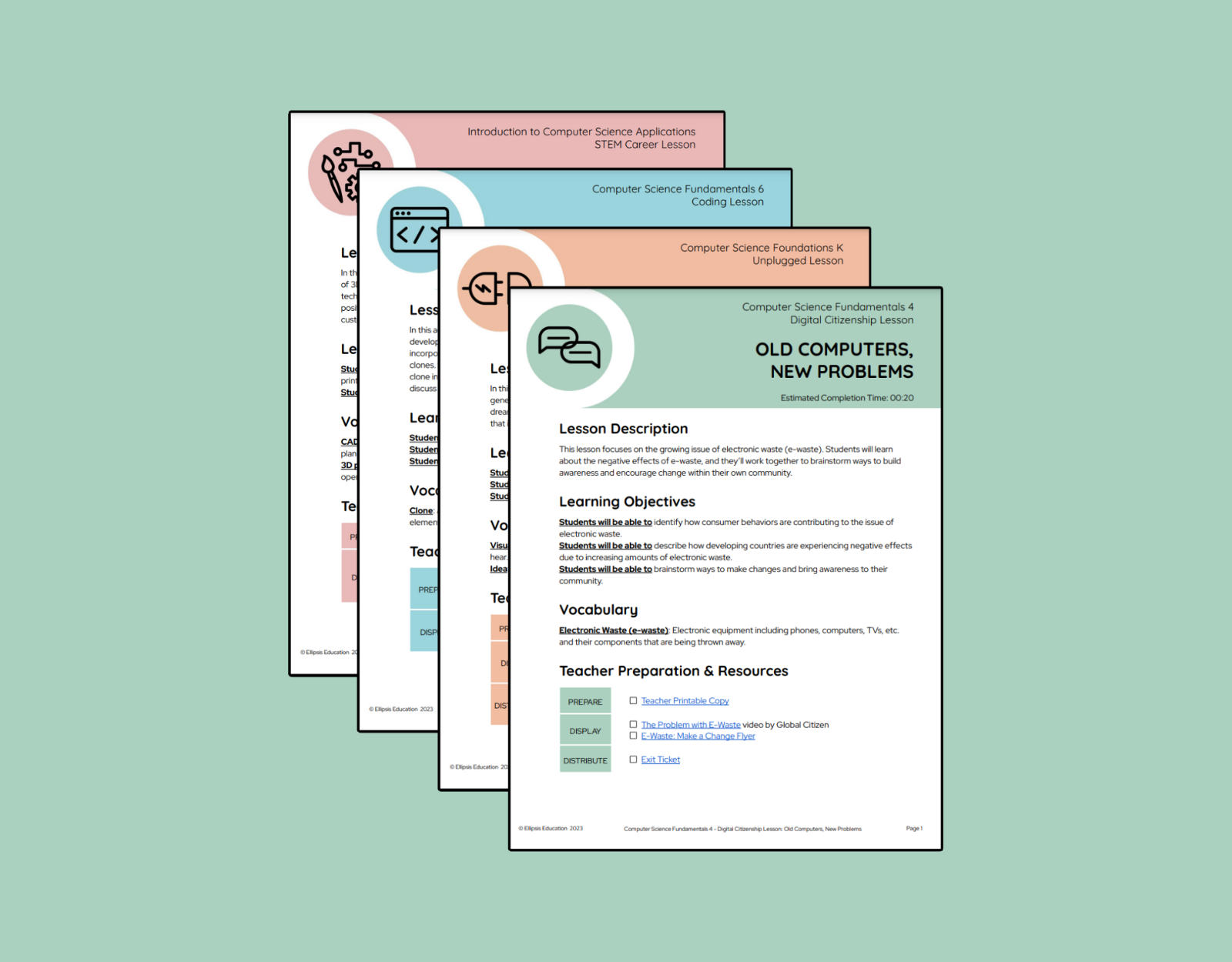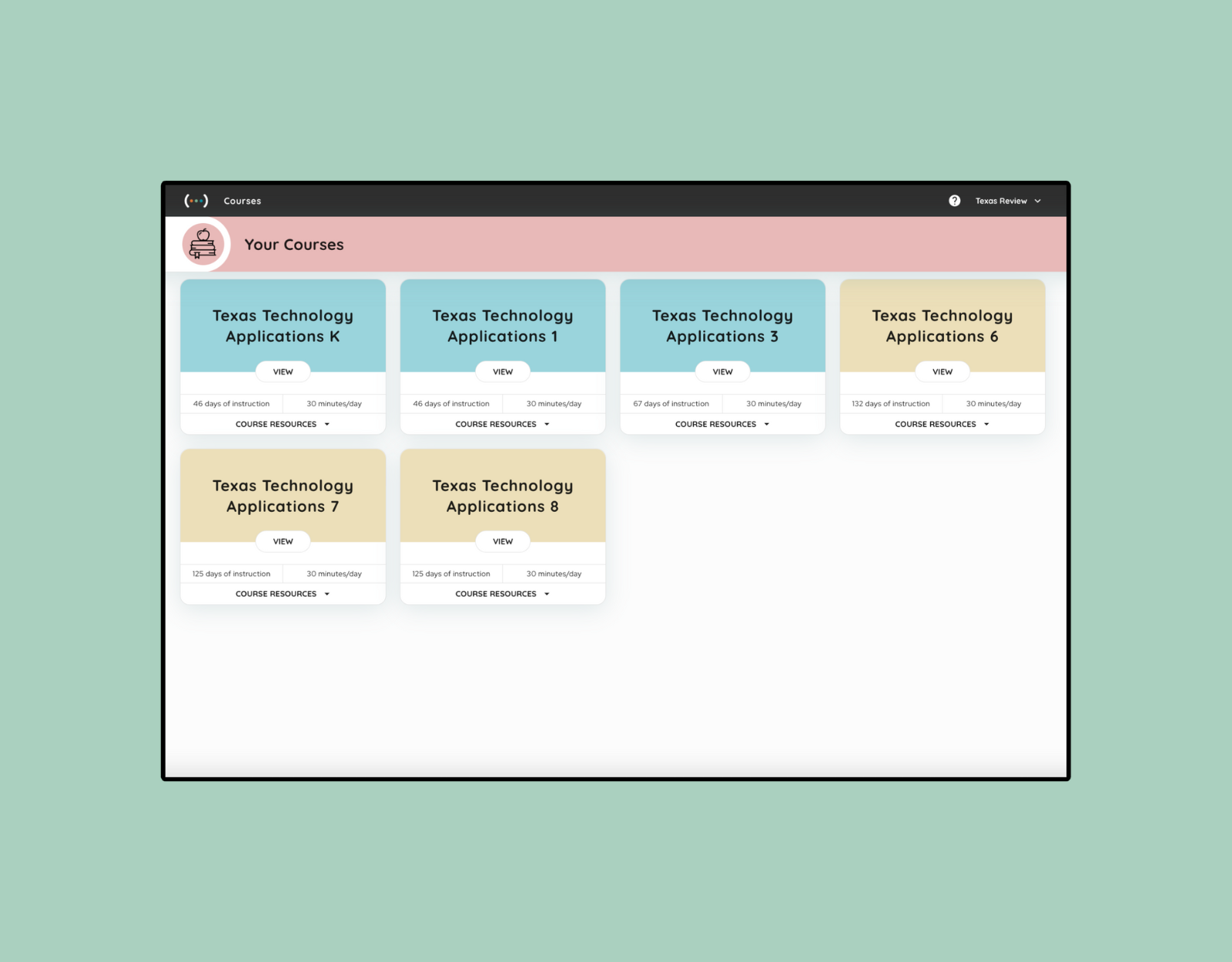Technology TEKS Elementary
The Technology Applications TEKS are up for review this year as part of Proc 24! Ellipsis Education is in the running to become an Approved Instructional Material. We put learning in context so a teacher, not a machine, helps students connect the dots and apply technology skills in their lives. Learn more about the Tech Apps TEKS and our curriculum.
Why Ellipsis Education?
There are many different programs that support the Technology Applications TEKS.
District partners choose to work with Ellipsis Education because they believe:
K-8 Tech Apps Curriculum
Our K-8 courses have everything you need to get students going: detailed lesson plans (beyond just coding), pacing guides, standards maps, and ongoing support.
Thoughtfully Designed for Texas Educators
With Ellipsis curriculum, teachers put learning in context so students can tie it all together.
Computer science, taught by teachers.
Comprehensive curriculum from Ellipsis Education (Coder Kids, Inc.) puts learning in context, so a teacher, not a machine, brings computer science to life. Explore curriculum for K-5 (state-adopted instructional material) and 6-8 (TEKS aligned).
Technology TEKS Elementary
Technology TEKS Elementary is a crucial aspect of the modern educational system in Texas. The Texas Essential Knowledge and Skills (TEKS) are the state’s standards for K-12 education and outline what students should know and be capable of doing at each grade level across various subject areas, including technology and computer science. As technology continues to evolve and permeate every facet of life, it becomes increasingly important that elementary students have a strong foundation in these skills.
The Texas TEKS provide guidelines for teaching essential technology knowledge and skills that equip students for future success. One of the primary goals of these standards is to facilitate the integration of technology into various content areas seamlessly. That allows students to learn about technology and apply their understanding to real-life situations.
One critical component of the technology TEKS is establishing standards for computer science education in elementary schools. With society’s increased reliance on computers, software programming, and digital systems across various industries, it has become vital that young learners develop essential computational thinking abilities early on. As part of the *TEKS computer science* requirements, educators introduce basic coding concepts and problem-solving skills through age-appropriate activities and programs.
Another critical aspect of Technology TEKS Elementary education involves addressing ethical concerns associated with technology use. The rapid advancement of digital tools has led to new challenges around privacy, information security, and responsible online behavior — topics educators should discuss with young learners as they begin navigating the digital world.
In addition to providing a framework for computer science instruction at the elementary level, Technology TEKS also plays a pivotal role in ensuring equitable access to technological resources. Given how heavily modern society depends on digital tools and resources in virtually every field or industry sector, it’s essential to foster social equity and bridge gaps between communities with varying levels of access to technology.
Moreover, the TEKS technology standards help educators develop curricula that facilitate hands-on learning experiences, enhancing student engagement and retention. Technology is an inherently interactive medium, with tools and devices designed for touch-based manipulation and instant feedback. By integrating these tools into classroom instruction, teachers can create immersive learning environments that encourage curiosity, exploration, and experimentation — all essential components of a well-rounded education.
In summary, Technology TEKS Elementary plays a significant role in shaping students’ early experiences with technology as they embark on their educational journey in Texas. These TEKS standards provide a firm foundation for computer science education while addressing ethical considerations around digital citizenship and promoting equitable access to resources across various socio-economic backgrounds.
Key Components of Technology TEKS for Elementary Education
The key components of Technology TEKS for elementary education help students navigate the digital world proficiently. As technology continues to evolve rapidly, elementary schools must incorporate computer education into their curriculums to equip young learners with foundational digital skills. This section delves into several integral aspects of Technology TEKS for elementary education, including:
- Digital citizenship
- Elementary computer curriculum
- TEKS coding
Digital Citizenship
Digital citizenship is an increasingly important aspect of modern society that students must know about. By cultivating responsible and ethical digital citizens early on in their academic journeys, schools help ensure children develop healthy online habits as they grow older. Educators can promote digital citizenship literacy by teaching students about internet safety, cyberbullying prevention, data privacy awareness, and appropriate use of social media platforms.
Elementary Computer Curriculum
An effective elementary computer curriculum should encompass a variety of components designed to foster both technical proficiency and responsible online behavior among students. That could include lessons dedicated to:
- Keyboarding
- Word processing tools
- Basic graphic design with applications
- Web-based research methods using search engines like Google or Bing,
- File organization techniques for cloud storage solutions
TEKS Coding
To reinforce the above computer science principles, educators should consider implementing TEKS coding exercises into their lesson plans. By introducing fundamental programming languages like Scratch through interactive games and creative projects, students can develop their problem-solving skills and critical thinking abilities in a fun and engaging manner. This hands-on approach enables them to grasp complex coding concepts easily while becoming more accomplished and confident in their growing skills.
Benefits and Impact of Implementing Technology TEKS in Elementary Education
The benefits and impact of implementing Technology TEKS in elementary education are substantial and far-reaching. In recent years, there has been a growing recognition of the importance of incorporating technology into the classroom, with many educators realizing that young learners need digital skills to thrive. As such, integrating Technology TEKS into elementary education has become an increasingly popular approach.
One significant advantage of a TEKS guide is that it offers a comprehensive framework for integrating technology into the curriculum. That can ensure students receive a well-rounded introduction to various facets of digital literacy and develop critical thinking and problem-solving skills through engaging hands-on projects. For instance, by following computer science TEKS lesson plans, teachers can incorporate coding and programming activities from an early age, helping students build a strong foundation in computational thinking. Moreover, implementing TEKS resource systems can support educators as they incorporate technology across different subject areas.
A versatile TEKS resource guide can serve as an invaluable tool for teachers who wish to integrate digital tools into their instruction while adhering to specific learning objectives outlined within the curriculum. That ensures students’ exposure to technology is meaningful and directly aligned with their academic goals.
In addition to nurturing essential digital skills among elementary school students, employing TEKS lesson plans can also boost overall engagement within a classroom setting. By allowing young learners to access interactive resources such as educational apps, multimedia content, or virtual simulations through carefully curated TEKS resource guide materials, educators can foster curiosity and enthusiasm for learning. This increased motivation translates into higher levels of participation and involvement among students.
Furthermore, integrating technology TEKS in elementary education not only benefits students. It also has the potential to enhance teacher collaboration and professional development. By aligning their instructional approaches with TEKS guidelines and TEKS lesson plans, educators can easily exchange ideas, best practices, and resources related to technology integration. In turn, this encourages a culture of continuous improvement among teaching staff as they learn from each other’s experiences and insights when implementing TEKS resource systems.
Finally, it is worth noting that embracing technology TEKS in elementary education helps to foster a generation of responsible digital citizens. By introducing students to concepts such as digital etiquette, online safety, and data privacy from an early age, teachers can play an integral role in shaping how young people approach and interact with technology throughout their lives. That is crucial for ensuring students make informed decisions about online behavior and promoting a broader understanding of digital technology ethics.
Ellipsis Education Tech Apps
Ellipsis Education is a computer science curriculum provider that empowers K-12 students and their teachers. Computer science courses from Ellipsis Education provide educators with everything they need, from standards maps to lesson plans that go beyond coding. Teachers can also access pacing guides and ongoing support, allowing them to equip students with the knowledge and skills to prosper in a digital world.
Related Links
Ready to Learn More?
See how Technology Applications Curriculum from Ellipsis Education can work in your district. Request a meeting with our accounts team to share your goals and explore our Tech Apps curriculum. If interested, you can also explore our computer science offering for grades 6-8.






